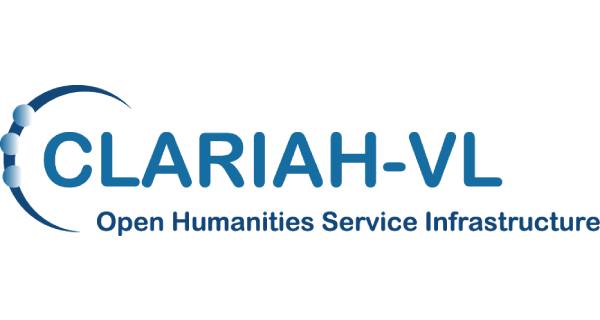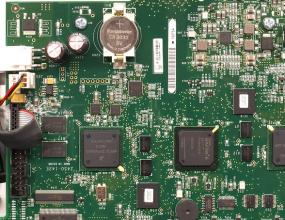CLARIAH-VL: Open Humanities Service Infrastructure is the Flemish contribution to the European DARIAH and CLARIN infrastructures. It brings together and extends the portfolio of services enabling digital scholarship in the Arts and Humanities offered by the DARIAH-VL Virtual Research Environment Service Infrastructure (VRE-SI; Hercules & FWO 2015-2018) with the digital tools and language data that are offered through CLARIN-DLU/Flanders.
The consortium which includes the network of Digital Humanities Research Centres at the universities of Antwerp, Brussels, Ghent and Leuven has been extended with the Dutch Language Institute (INT) – the CLARIN-ERIC certified B-Centre for Flanders.
CLARIAH-VL will implement a modular research infrastructure embedding high-quality, user-friendly tools and resources into the workflows of humanities researchers in the five focus areas of linguistics; literature; socio-economic history; media studies; ancient history and archaeology. CLARIAH-VL aims to provide sustainable services, while fostering experimental development and innovation.
Offering an open infrastructure which facilitates public humanities is a guiding principle for CLARIAH-VL. It will ensure the accessibility and relevance of the humanities to the general public, specific (heritage) community groups and policy makers. It will make it technically possible to share knowledge, including sharing and co-creating knowledge with non-specialist users, such as facilitating citizen science and crowdsourcing projects.
Furthermore, by implementing international best practices in FAIR (Findability, Accessibility, Interoperability and Reusability) Research Data Management (RDM), CLARIAH-VL will pave the way to Flemish participation in the European Open Science Cloud.
CLARIAH-VL will offer a unique combination of high-quality and user-friendly tools and resources that can be seamlessly embedded into the everyday workflows of humanities researchers, designed to improve the utility, accessibility, reusability, and sustainability of their research processes and data.
Open humanities is a guiding principle for contemporary research. As researchers we need to demonstrate the relevance of the humanities for the general public, heritage community groups and policy makers. Collaborative research paradigms of co-creation and participatory engagement, sharing authority and actively engaging with different communities, are at the heart of our vision for the digital future of the humanities. For this, we need open humanities infrastructures to make it technically possible to share knowledge, including sharing and co-creating knowledge with non-specialist users and facilitate citizen science.
Just some of the tools CLARIAH will offer include:
- a IIIF-enabled Corpus Management Platform, enabling researchers to build a research corpus from a variety digital resources and export the textual data for analysis with digital research tools
- a participatory deep mapping platform to facilitate crowdsourcing a rich array of geo-spatially annotated resources
- a web-based platform for the publication of digital scholarly editions and
- a linked open data infrastructure for analysing, sharing, connecting and enriching arts and humanities research data.
Furthermore, CLARIAH-VL will stimulate computational advances in the arts and humanities; such as advancing machine learning towards in-depth processing of big data and granular computing, with a prime role for Natural Language Processing (NLP) as a way of meeting the expectations of humanities scholars wanting to interpret the vast amount of digitized data that has become available.
Finally, CLARIAH-VL will help prepare arts and humanities researchers for participation in initiatives such as the European Open Science Cloud (EOSC), which is set to become an open and trusted environment for storing, sharing and re-using scientific data across disciplines and borders.








